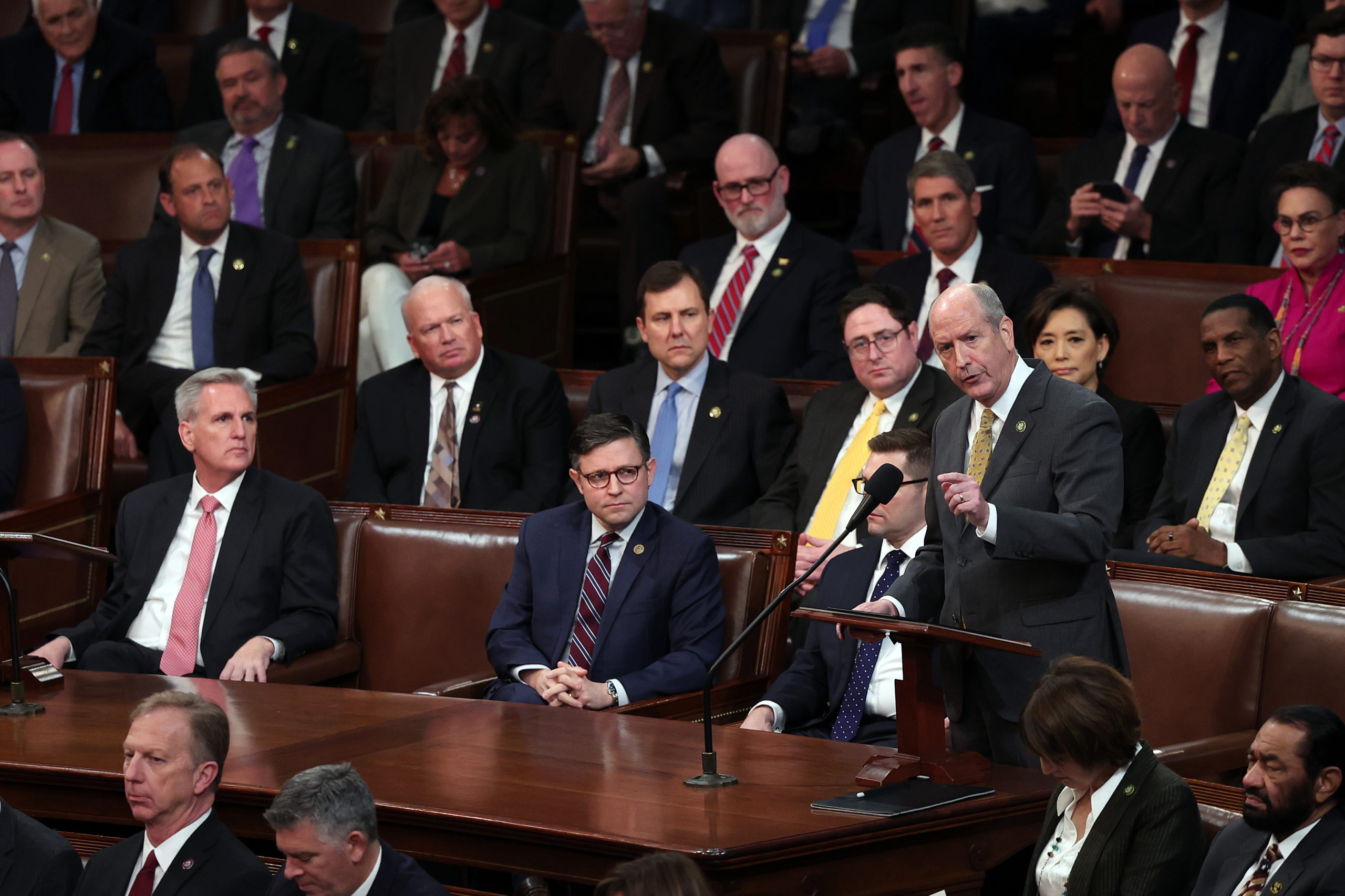Shutdown Season
As a government shutdown deadline nears, Republican infighting continues.

The dog days of summer are coming to an end, as is Congress’s August recess. September ushers in the fall, and with it, this year, the potential for a government shutdown.
Washington will have a matter of days to shake off its summer lethargy and kick things into high gear. The Senate returned to work Tuesday, but the House won’t be back until September 12. The lower chamber will meet for just 11 days before the September 30 deadline, which marks the end of the government’s fiscal year, for passing a continuing resolution to fund the government. All the while, concerns about Republican leadership in both chambers percolate, given Mitch McConnell and Louisianan Rep. Steve Scalise’s health issues, and the possibility of House Speaker Kevin McCarthy being threatened with a motion to vacate.
The last major Congressional fight over the nation’s finances was the early summer’s contretemps over the debt ceiling. The deal McCarthy struck with President Joe Biden suspended the nation’s debt ceiling, allowing the government to borrow more to pay for previously incurred debts until January 2025. The deal included some spending floors for the government, but Freedom Caucus–influenced spending bills advanced by Republicans in the House have not met those targets.
In an echo of that debt ceiling fight, the Freedom Caucus has released a series of demands to earn their support in staving off a government shutdown. “In the eventuality that Congress must consider a short-term extension of government funding through a Continuing Resolution, we refuse to support any such measure that continues Democrats’ bloated COVID-era spending,” the caucus said in an August 21 release. “Any support for a ‘clean’ Continuing Resolution would be an affirmation of the current FY 2023 spending levels grossly increased by the lame-duck December 2022 omnibus spending bill that we all vehemently opposed just seven months ago.”
The Freedom Caucus laid down red lines, too. They promised to “oppose any spending measure,” that does not include three items: First, “the House-passed ‘Secure the Border Act of 2023’ to cease the unchecked flow of illegal migrants, combat the evils of human trafficking, and stop the flood of dangerous fentanyl into our communities”; second, measures to “address the unprecedented weaponization of the Justice Department and FBI”; and finally, measures to “end the Left’s cancerous woke policies in the Pentagon undermining our military's core warfighting mission.”
As for funding the Ukraine war, the House Freedom Caucus “will oppose any blank check for Ukraine in any supplemental appropriations bill.”
But McCarthy is pleading with the caucus and aligned conservative members to drop efforts to pass spending bills with conservative priorities, such as the effort to end the Pentagon’s program to reimburse women in the military who travel to procure abortions. Instead, McCarthy is pushing them to save those fights for negotiations over long-term government spending bills later this year and to support the short-term solution of a clean Continuing Resolution without protest.
McCarthy has a point. Time and time again, the political party that is perceived to be the cause of a government shutdown suffers electorally. Most of the time, Republicans bear the brunt of that effect; Democratic spending takes the nation to the brink, and the only way out is more spending. Democrats have no qualms about that. Republicans do, and their opposition to further spending appears to be support for dysfunction and a government shutdown—though the consequences of that are frequently overstated. The Republican argument, that Washington’s runaway spending is the cause of a potential shutdown in the first place, hardly ever lands with voters because at the argument is too late. When a shutdown fight comes, Republicans have already lost, and Republicans suffer the consequences.
That is especially true in this case. The Continuing Resolution that will probably end up passing will continue spending plans passed by a Democrat-controlled Congress in a lame-duck session.
Conservative members of Congress remember the 2022 Omnibus well, however. “We will oppose any attempt by Washington to revert to its old playbook of using a series of short-term funding extensions designed to push Congress up against a December deadline to force the passage of yet another monstrous, budget busting, pork filled, lobbyist handout omnibus spending bill at year’s end and we will use every procedural tool necessary to prevent that outcome,” a House Freedom Caucus release from August read.
Subscribe Today
Get daily emails in your inbox
Also top of mind for conservative Republicans is the aforementioned debt ceiling debacle. After McCarthy struck a deal with Biden, McCarthy and GOP House leadership touted spending cuts, moving federal funds to veterans and defense, protecting some of former President Donald Trump’s tax cuts, and work requirements for food aid.
Many conservative members of Congress, however, thought McCarthy was snatching defeat from the jaws of victory. The spending cuts obtained by McCarthy were fractions of the proposed spending cuts the GOP-led House passed in the Limit, Save, Grow Act. For example, the Limit, Save, Grow Act would have rescinded the $80 billion provided for Biden’s massive IRS expansion in the Inflation Reduction Act. The McCarthy-Biden deal cut just over $1 billion from the IRS. Other proposed cuts and repurposing were merely suggestions that the Biden administration could circumvent. The deal also provided funding for the Mountain Valley Pipeline, which will transport natural gas through Appalachia—a West Virginia Sen. Joe Manchin reelection item. In the end, more Democrats than Republicans voted in favor of the debt ceiling hike, which is a telltale sign Republicans lost.
If Republicans are stuck passing Democratic spending priorities even in lame-duck sessions of Congress or on the eve of a government shutdown, at some point, conservatives must resolve to strengthen their hand and bet big. It’s a gamble, but maybe it will take the Freedom Caucus's no-nonsense approach to pull Republicans out of the hole.
Comments